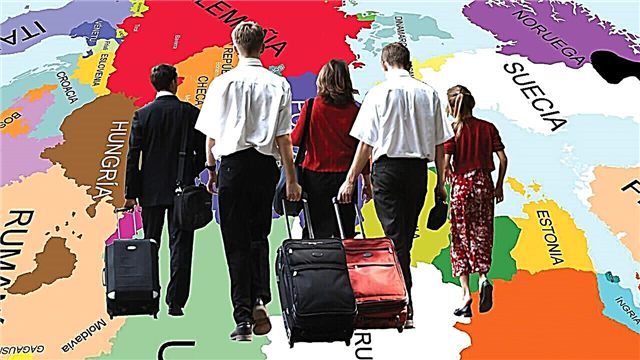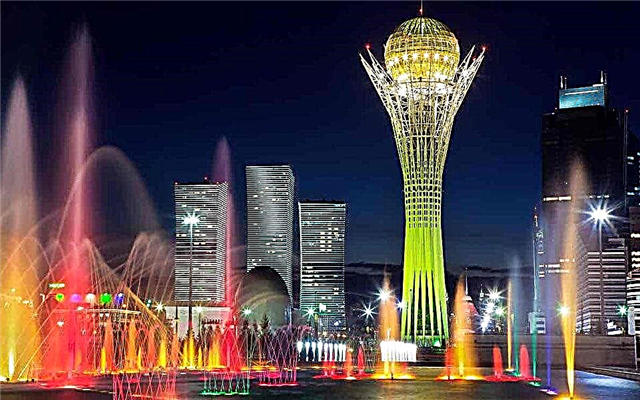In 2017, conflicts raged around the world that destabilized entire countries and regions. And it is unlikely that 2018 will pass quietly and calmly. We present you the top 5 most dangerous conflicts in the world. The list is based on a survey of German citizens conducted by the German Sociological Institute Yougov.
5. Ukrainian conflict
 Residents of Ukraine can rejoice: in Germany they are not forgotten. That's just the Germans remember about the Ukrainians, alas, not in a positive way.
Residents of Ukraine can rejoice: in Germany they are not forgotten. That's just the Germans remember about the Ukrainians, alas, not in a positive way.
Despite periodic clashes along the line of contact between Ukrainian government forces and militias from the LPR and DPR, the resumption of large-scale battles in this region has so far been avoided. Nevertheless, as long as most of eastern Ukraine remains in the hands of the authorities of the unrecognized republics, the potential for the resumption of civil war in this region remains.
Although the Trump administration rejected the close support offered to Kiev during the Obama administration, escalation of the conflict (or the collapse of the Kiev government) could threaten to draw Europe and the United States into the Ukrainian conflict.
4. Conflict between Iran and Saudi Arabia
 The leading Sunni and Shiite Muslim countries of the world have long been fighting for power in the region. The stumbling block in 2017 for them was the hostilities in Yemen and Syria.
The leading Sunni and Shiite Muslim countries of the world have long been fighting for power in the region. The stumbling block in 2017 for them was the hostilities in Yemen and Syria.
Iran is supporting the Hussite rebels in Yemen against whom the Saudi Crown Prince Mohammad bin Salman is fighting.
And the Saudis support the rebel Syrian forces and want to achieve the overthrow of President Bashar al-Assad - Iran’s main ally.
Also, according to the assumptions of Iranian politicians, Saudi Arabia has a destabilizing effect on the situation in Lebanon. The Lebanese government has a Shiite Hezbollah movement supported by Tehran.
Riyadh's negative attitude towards Iran, apparently, is shared by the American president. Trump said that this country is not successful and it is time for a change. And what are the changes that the United States likes, the world has already seen on the examples of Libya, Iraq and Ukraine.
If a full-blown conflict erupts between the first and fifth largest oil producing countries in the world, this will negatively affect the global economy. As they grimly joke on forums on the Web, gasoline in Russia will rise in price again.
3. Middle East conflict
 In a third place in the list of the most dangerous conflicts of 2018, the YouGov poll participants placed discord between Israel and Palestine, the "wood" into which the ubiquitous America threw up.
In a third place in the list of the most dangerous conflicts of 2018, the YouGov poll participants placed discord between Israel and Palestine, the "wood" into which the ubiquitous America threw up.
At the end of 2017, U.S. leader Donald Trump recognized Jerusalem as the capital of Israel, and decided to move his country's embassy from Tel Aviv to Jerusalem. Palestinians claim the eastern part of the Holy City. And the status of Jerusalem has long been one of the most important issues in Arab-Israeli relations.
While the Israeli prime minister expressed gratitude to Trump for the “courageous and fair decision,” the Palestinian authorities called the US actions a “crazy move” and refused Washington’s mediation in the peace talks to resolve Middle East problems.
Turkey did not stand aside, supporting Palestinian Muslims. Its leader, Tayyip Erdogan, said he did not rule out the severance of diplomatic relations with Israel.
The growing tension in the Middle East could turn into a new wave of refugees for Germany and other European states.
2. “Islamic state”
 Judging by the results of the survey, the organization banned in Russia is very frightening to the Germans. In November last year, the Syrian army with the support of the Russian military managed to take control of the last bastion of ISIS - the city of Abu Kemal. After that, thousands of militants crawled into remote areas of Syria and Iraq, or fled abroad. This poses a threat to ISIS-related terrorist acts in Europe, Russia and the Middle East.
Judging by the results of the survey, the organization banned in Russia is very frightening to the Germans. In November last year, the Syrian army with the support of the Russian military managed to take control of the last bastion of ISIS - the city of Abu Kemal. After that, thousands of militants crawled into remote areas of Syria and Iraq, or fled abroad. This poses a threat to ISIS-related terrorist acts in Europe, Russia and the Middle East.
And the publication Zeit warns: soon many women and young fighters who fought on the side of the “Islamic State” may return to Germany. According to the authorities of Germany, about 960 Islamists left for Syria and Iraq from Germany. And about a third of them, presumably, have already returned.
1. North Korean conflict
 The first place in the ranking of the most dangerous world conflicts is the confrontation (fortunately, so far only in words) between the United States and North Korea.
The first place in the ranking of the most dangerous world conflicts is the confrontation (fortunately, so far only in words) between the United States and North Korea.
Pyongyang does not show any intention to stop its missile tests and the development of nuclear weapons until it creates a weapon that can strike not only at close range, but also at distant enemies (read - the United States).
This behavior of the North Korean leader could force the United States to launch hostilities by striking North Korea’s missile and nuclear facilities. This will cause a devastating conflict on the Korean Peninsula into which China, Japan and other forces in the region may intervene.
To say that such a scenario will have a great influence on the situation in the world is a very strong understatement. Most experts believe that this could lead to the most brutal hostilities since World War II.
Former CIA chief John Brennan in an interview with The Atlantic cited Donald Trump's unpredictability as an important factor affecting US-Korean relations. “I understand very well that North Korea does not want to initiate a major military clash. And for many years, the United States did not want to start a conflict, ”Brennan said. And he added that he did not know "what Mr. Trump is capable of deciding or doing."
What conflicts did 2017 remember?
The full-scale wars that took place in 2017 included:
- Syrian civil war.
- The civil war in Afghanistan.
- Iraqi Civil War.
- The civil war in Somalia.
- The civil war in South Sudan.
- Civil war in Libya.
- Civil war in Yemen.
At the same time, there were dozens of uprisings that took place around the world in 2017. Some of the most famous rebellions were:
- drug war in Mexico;
- the terror of the Boko Haram group in Nigeria and neighboring countries;
- conflict in northern Mali;
- conflict in the Central African Republic of the Congo;
- Conflict between Kurdish militias and government forces from Turkey and Iraq.
Overall, it was estimated that more than 100,000 people died directly as a result of these conflicts and riots in 2017, and millions of other people were affected, directly or indirectly.












